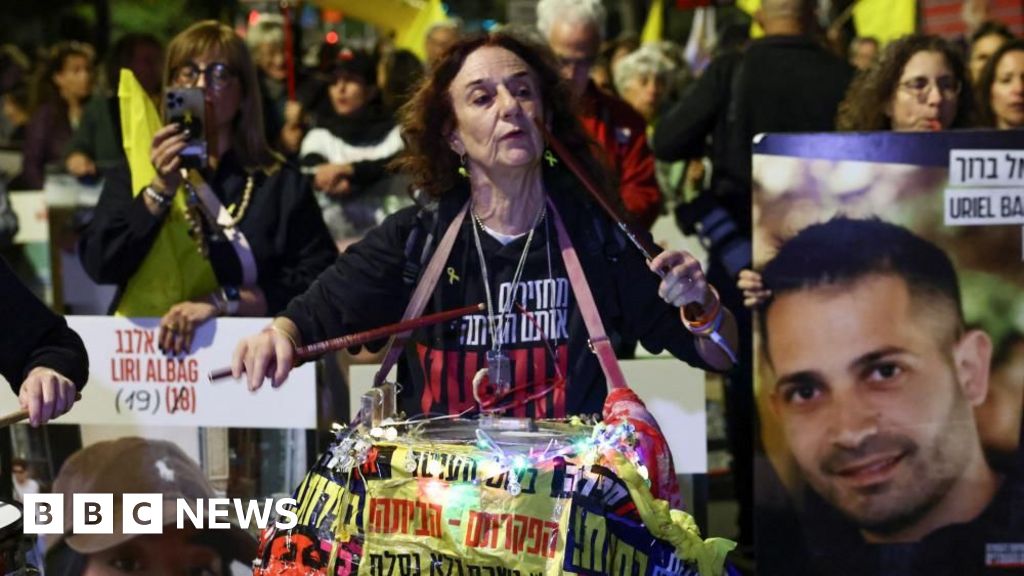Attempts to secure a peace deal in Gaza and secure the release of hostages held by Hamas may have been compromised by leaked and falsified documents involving a close aide to the prime minister, an Israeli court has said.
In its partial lifting of a gagging order, the court in the town of Rishon LeZion said Eli Feldstein and three others were under investigation.
Prime Minister Benjamin Netanyahu has denied wrongdoing by his staff, but opposition figures and hostage families have accused his government of sabotaging negotiations.
The leaking of the documents – to Britain’s Jewish Chronicle and Germany’s tabloid Bild – came at a crucial time for hostage negotiations.
The documents claimed Hamas was planning to smuggle Israeli hostages to Egypt – intent on scuppering any proposed ceasefire deal.
Some commentators say the revelations were politically useful for Netanyahu’s hardline position on the talks, which have made almost no progress.
Over 100 hostages out of 251 taken by Hamas on 7 October 2023 remain unaccounted for.
After the stories were published in September, the Israel Defense Forces (IDF) launched an inquiry to discover the source of the leaks.
This eventually led to the arrest of Eli Feldstein, along with the three others, whose identities have not been revealed.
Mr Feldstein had been working as a government spokesperson and was often seen accompanying the prime minister on visits. He had previously worked for the far-right Minister of National Security, Itamar Ben-Gvir, and before that he served as an IDF spokesperson.
Following news of his arrest, two leading opposition politicians held a press conference.
Benny Gantz, who until recently was in Netanyahu’s war cabinet, said that if sensitive security information was used for a “political survival campaign”, it would not only be a criminal offense, but “a crime against the nation”.
Speaking at the same event, the leader of the opposition, Yair Lapid, said that if the prime minister knew about the leaks, “he is complicit in one of the most serious security offenses” and that if he didn’t know, he is not fit for office.
The revelations also led to strong criticism from the families of the hostages, who have become increasingly frustrated with the government’s failure to secure the release of their loved ones.
They said it implied an active campaign to discredit them, calling it “a moral low that has no depth. This is a fatal injury to the remnants of trust between the government and its citizens”.
The documents were published in European newspapers, allegedly to circumvent military censorship laws in Israel.
The Jewish Chronicle (JC) was engulfed in a scandal after it emerged it had published stories based on a single anonymous source. The freelance writer behind the pieces was fired, with the articles eventually being taken down.
The articles claimed that Yahya Sinwar was surrounded by a ring of around 20 hostages and that plans had been discovered to smuggle both the captives and the Hamas leader into Egypt. Leading Israeli security journalists questioned the veracity of the reports.
A number of high-profile writers resigned from the paper, accusing it of lacking journalistic standards.
Jonathan Freedland, Hadley Freeman and David Aaronovitch announced they were quitting their columns over what Freedland described as a “great disgrace” at the world’s oldest Jewish newspaper.
At the time, the JC said it conducted a “thorough investigation” into one of its freelance journalists, Elon Perry, “after allegations were made about aspects of his record”.
It said it was “not satisfied” with some of the claims made by the writer, and therefore had deleted his articles and ended its association with him.
Elon Perry told BBC News the JC “made a huge mistake with its statement”. He said he could not reveal his source to JC editors and described a “witch-hunt against me caused by jealousy”.
The Bild articles, meanwhile, were based on a different set of intelligence documents. While they were found to be authentic, leading security journalist Ronan Bergman found their significance had been greatly exaggerated.
It was the publication of this story that triggered the investigation by the IDF and security services, ultimately leading to the arrests.
Netanyahu has sought to distance himself from the allegations, saying the arrested spokesperson had never had access to classified information.
Despite that, this is a growing scandal that has further damaged the already frayed relationship between the government and the hostage families.











